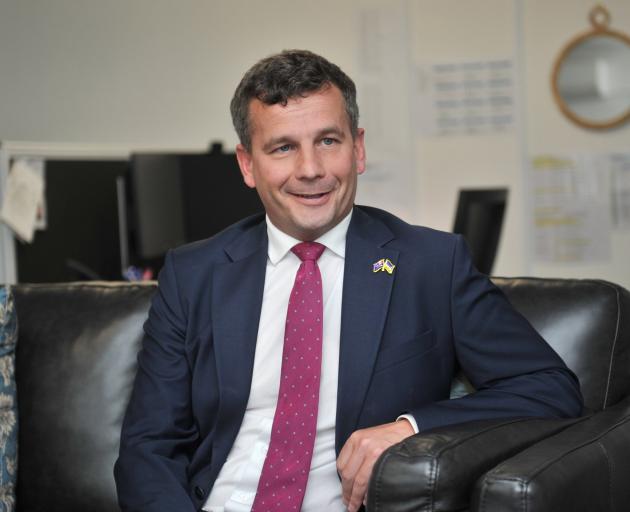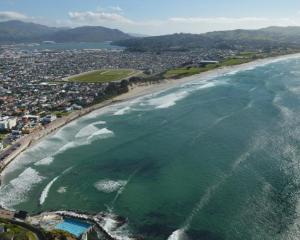
There is an old song by US band Talking Heads called Heaven, where lead singer David Byrne croons that heaven is a place where nothing ever happens.
It is a sentiment Act New Zealand leader David Seymour would probably endorse. Although he is spending the day in Invercargill, far away from Parliament, he is also acting Prime Minister as Christopher Luxon is pushing trade deals in Vietnam and Deputy Prime Minister Winston Peters is in China.
"One time, I was acting for Chris, and the CrowdStrike event happened," Mr Seymour recalled.
"I was actually about to go home. I heard about it on the radio, and I thought, ‘sheesh, someone should do something about that’. And then I thought, ‘oh shit. That’s me’. So I called up the DPMC [Department of the Prime Minister and Cabinet] and said, ‘what are we doing about this?’."
This will likely become a more common occurrence for Mr Seymour: on May 31, as part of the coalition government agreement, Mr Peters relinquishes the role of deputy prime minister and Mr Seymour takes over.
Right now, a Chinese naval flotilla near New Zealand waters is the day’s major concern, but Mr Seymour also has the insurance that Mr Peters is, fortuitously, in the People’s Republic and able to put New Zealand’s case in person.
"I prefer that there aren’t any events but, you know, in this country, you’re never far from an earthquake or a flood, or there’s some speculation of a tsunami that doesn’t seem to have come to pass, thankfully, or a virus, either of the human type or the computer type," he said.
"I’d be quite happy just to get through to Saturday and not have any disasters."
Or distractions most likely. Mr Seymour’s trip South came hot on the heels of arguably his worst week in the House.
While still dealing with the fallout from his advocacy for constituent (and eventually murder-acquitted) Philip Polkinghorne and the imprisonment of former Act president Tim Jago, Mr Seymour — controversially — attempted to take a Land Rover for a spin up Parliament’s steps.
"It really hasn’t," he said when asked if the Jago case and the incident on the steps had been distractions.
"Our brief involvement, if you can call it that, was over two years ago now, and knowing all the facts I don’t believe that we could have done anything different. In fact, I think we followed, well, I know we followed, the legal advice we received in the letter of the law.
"We are on message. Other people are talking about something without knowing the facts. And actually, feedback I get from around the country is ‘I wish that Land Rover went all the way to the top of the steps’ ... I think, frankly, what that incident showed is that there are far too many people who are far too censorious of something that didn’t actually break any rules, didn’t put anyone in danger.
"And ultimately, the fundraising event within a week went from about eight grand to 45 grand ... It was really a conflict between shouldn’t you be able to do what you like in this country as long as you’re not harming anyone else versus the rather tedious, censorious underbelly of the national psyche."
The "censorious underbelly", as Mr Seymour terms it, has been at its loudest in its disapproval of himself and his party concerning the Principles of the Treaty of Waitangi Bill.
As he speaks the justice select committee is meeting in Wellington to hear submissions on Mr Seymour’s controversial proposal to codify what the principles are, proposed legislation which has attracted a record number of submissions and in-person submitters.
The vast majority have been opposed to the Bill; Mr Seymour has also fronted the largest protest in the capital in years, the Hīkoi mō te Tiriti, a fiery gathering of opposition to the very idea.
Despite all that, and the near certainty the Bill will not pass second reading, Mr Seymour is adamant the debate has been worth it.
"Yes, there has been a lot of opprobrium, but only because I think we’ve revealed the problem is bigger than we first thought ... There are a group of New Zealanders now, both Māori and Pākehā, who believe in New Zealand as a kind of segregated state. They genuinely believe that there should be a different political role for a group of people based on ancestry.
"It’s quite a chilling thing, but it’s now deeply embedded and vociferous, and any challenge to that is vociferously responded to. People will blame me for uncovering that, but all I’ve done is uncover something that was there."
Mr Seymour also argued the controversy had not proven a distraction to Act, which had succeeded in implementing policies such as reinstating charter schools, retooling the school lunch programme, revamping the Overseas Investment Act, scrapping the Māori Health Authority and several other Act policies.
A read of the coalition agreement between Act and National reveals a considerable number of its bullet points have been ticked off, a fact which led to Mr Seymour’s somewhat arrogant-sounding comment some months ago about Act having a disproportionate influence on the government.
"That remains objectively true," he said.
"You just have to go through those quarterly plans and say how many of these things come directly from the Act coalition agreement. Often it was half of them, and you’ve got to remember there’s a total of 68 MPs in the government, all government-aligned MPs. And we have 11, so we are just under one-sixth of the government.
"And yet our influence, I think, is highly disproportionate."
That is something Mr Seymour hopes will continue when he becomes deputy prime minister.
He cites mental health, addressing New Zealand’s structural financial deficit, boosting economic growth, innovations in healthcare and another potentially controversial conversation — this time about pension entitlements — as potential issues to be addressed when the coalition whistles halftime and changes sides,
He also, perhaps with the next briefing on the Chinese flotilla looming large in his mind, cites defence spending as another issue to be addressed.
‘There are issues where Act has really played the role of keeping the government bold, and I think that continues to be our job," Mr Seymour said.
"At the end of the day, the only way forward is to do what you believe to be true and see who’s with you at the end."













